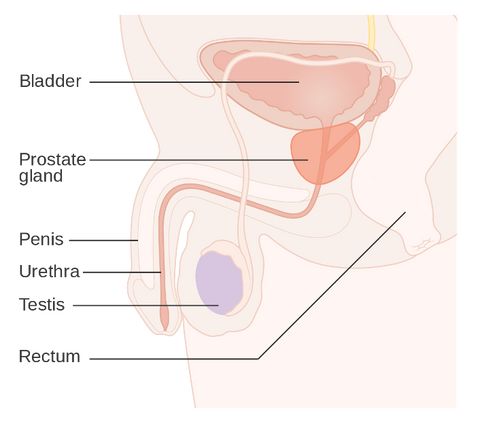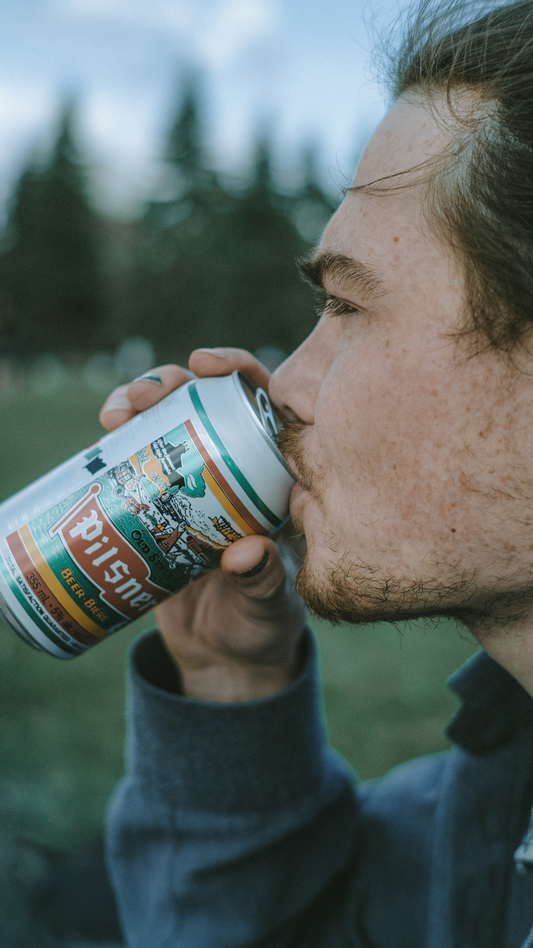MEN AND PROSTATE CANCER
Prostate cancer is the most common cancer in men. In the UK, about 1 in 8 men will get prostate cancer in their lifetime. The chance of getting prostate cancer goes up as a man gets older. Prostate cancer mainly affects men over 50. If you’re under 50, your risk of being diagnosed with prostate cancer is very low, but it is possible. The risk is even higher for men with a family history of prostate cancer and for black men (in the UK, about 1 in 4 black men will get prostate cancer in their lifetime).
Men are two and a half times more likely to get prostate cancer if their father or brother has had it, compared to a man who has no relatives with prostate cancer. The risk for a man getting prostate cancer may also be higher if his mother or sister has had breast cancer. Recent research also suggests that obesity increases the risk of prostate cancer.
So, what is the prostate? The prostate is a gland. It is usually the size and shape of a walnut and grows bigger as you get older. It sits underneath the bladder and surrounds the urethra, which is the tube that carries urine out of the body. The prostate's main job is to help make semen – the fluid that carries sperm.

Prostate cancer can develop when cells in the prostate start to grow in an uncontrolled way.
Some prostate cancer grows too slowly to cause any problems or affect how long you live. Because of this, many men with prostate cancer will never need any treatment.
But some prostate cancer grows quickly and is more likely to spread. This is more likely to cause problems and will need treatment to stop it spreading.
SYMPTOMS OF PROSTATE CANCER
Prostate cancer usually develops slowly, so most men with early prostate cancer don’t have any signs or symptoms.
Symptoms of prostate cancer do not usually appear until the prostate is large enough to affect the tube that carries urine from the bladder out of the penis (urethra).
When this occurs, you may notice:
a sudden or increased need to pee
difficulty or straining while you pee
a weak flow when you pee
a feeling that your bladder hasn’t fully emptied
dribbling pee after you finish urinating
These symptoms should not be ignored, but they do not mean you have prostate cancer. It's more likely they're caused by something else, such as prostate enlargement.
If prostate cancer breaks out of the prostate (locally advanced prostate cancer) or spreads to other parts of the body (advanced prostate cancer), it can cause other symptoms, including:
back pain, hip pain or pelvis pain
problems getting or keeping an erection
blood in the urine or semen
unexplained weight loss
You can’t check for prostate cancer yourself so there is no way of knowing if you have prostate cancer without visiting your doctor, as most men with early prostate cancer don’t have any symptoms. And, if you do have any symptoms, they can be caused by other health problems.
The discussion about screening with your GP should take place at:
Age 50+ for men who are at average risk.
Age 45+ for men at high risk. This includes black men and men who have a family history of prostate cancer, even if you don't have any symptoms.
The most commonly used tests for prostate cancer are: a blood test, a physical digital rectal examination (DGE), an MRI scan and a biopsy.
If you are diagnosed with prostate cancer and it’s caught early before it causes symptoms, there is a good chance treatment could stop the cancer spreading. It may not be possible to cure your cancer, but you may be able to have treatment to help control the cancer and manage symptoms.
There are things we can do to reduce the risk of cancer; this includes not smoking and keeping a healthy weight. For more tips on what you can do that make getting cancer less likely read on.
CANCER PREVENTION
You can’t control some risk factors, like getting older, but you can control many others. Two of the most important things you can do are making healthy choices and getting screening tests:
Maintain a healthy weight. The latest research suggests that being overweight may increase your risk of being diagnosed with aggressive or advanced prostate cancer. Obesity increases the risk of many forms of cancer. Calories count; if you need to slim down, take in fewer calories and burn more with exercise.
Exercise regularly. Men who are active are more likely to be a healthy weight and less likely to develop health problems. Physical activity has been shown to lower the risk of several types of cancer, including prostate cancer. It also reduces the risk of other serious diseases such as diabetes and heart disease.
Have a healthy balanced diet. Eating a healthy, balanced diet and keeping physically active can help you stay a healthy weight, and so might help to lower your risk. There are lots of healthy eating tips and recipes on the NHS and World Cancer Research Fund websites.

Limit consumption of fast foods and other processed foods and drinks that are high in fat or sugar.
Certain foods might lower your risk, including pulses, such as beans, peas, lentils and soya foods, and foods containing:
Lycopene: such as tomatoes and tomato products
Selenium: such as Brazil nuts, fish, seafood, liver and kidney. Himmense SHIFT contains 55mcg of Selenium (100% NRV)
Vitamin E: such as nuts, seeds, wholegrains, green leafy vegetables, and avocados.
Some foods might increase your risk if you eat a lot of them such as processed and red meat, and high calorie foods and drinks:
Dairy foods - such as milk, yoghurt, and cheese, might increase your risk of prostate cancer. It is unknown as to why this is the case, but it is thought it may be because of the calcium in them. Dairy alternatives with added calcium, such as soya yoghurt or soya milk, also count as dairy foods.
Calcium - having too much calcium in your diet might increase your risk of prostate cancer. But you do need about 700mg a day to keep your bones healthy. You can get this from a balanced diet.
Processed and red meat - eating red and processed meat increases your risk of some types of cancer. Red meat includes beef, pork and lamb. Processed meat includes ham, bacon and other cured or preserved meats. The World Cancer Research Fund recommends eating no more than 500g of cooked red meat per week (700 to 750g when raw), and avoiding processed meat.
Drink sensibly. Drinking alcohol increases the risk of some types of cancer. Limit the amount of alcohol units you drink to 14 a week. Try to spread this out throughout the week and have some alcohol-free days. Drink mostly water and unsweetened drinks.
Don’t smoke. It goes without saying that not smoking is the biggest thing you can do to reduce your risk of cancer. If you smoke, you may be more likely to get an aggressive type of prostate cancer that is more likely to grow and spread to other parts of the body, and so you may be more likely to die from prostate cancer, if you get it. If you stop smoking, your risk should start to drop and after 10 years it could be as low as for men who have never smoked. Your GP can help you stop smoking and can tell you about ‘stop smoking’ clinics. Visit the NHS website for more information to help you stop smoking.
Make quality sleep a priority. Admittedly, the evidence linking sleep to cancer is not strong. But poor and insufficient sleep is associated with weight gain, which is a cancer risk factor.
Get enough vitamin D – sometimes known as the “sunshine vitamin”. Many experts now recommend 800 to 1,000 IU a day, a goal that's nearly impossible to attain without taking a supplement. Evidence suggests that vitamin D may help reduce the risk of prostate cancer, colon cancer, and other malignancies. In the U.K. the NHS advise everyone should consider taking a daily supplement of vitamin D during the autumn and winter. Himmense supplements contain Vitamin D.
Get regular cancer screening tests. Regular screening tests can catch some cancers early, when they’re small, have not spread, and are easier to treat.
Manage your mental health. One in three people with cancer will experience a mental health problem such as depression or anxiety disorders before, during or after treatment. A study suggests that for people with cancer who have a mental health problem, getting mental health treatment may help them live longer. Get tips here on managing your mental health.
HIMMENSE CANCER FIGHTING INGREDIENTS
Clinical studies have shown that several of the vitamins, minerals and plant extracts found in HIMMENSE supplements have anti-cancer properties and/or play an important role in treating cancerous cells. For example:
Research has shown that Ashwagandha has a number of benefits including treating cancerous cells. A review of the role of ashwagandha in cancer prevention found that the plant is highly effective in combating various types of cancers including breast, lung, colon, prostate, skin and blood cancer. You can read more about the benefits of Ashwagandha here.
Antioxidants like selenium help reduce oxidative stress by keeping free radical numbers in check to lessen our risk of diseases, including cancer. Studies have found that higher blood levels of selenium may protect against certain cancers, while supplementing with selenium may help improve quality of life in people undergoing radiation therapy. For example, a review of 69 studies that included over 350,000 people, found that having a high blood level of selenium was associated with a lower risk of certain types of cancer, including breast, lung, colon, and prostate cancers. Another review of 16 clinical studies on selenium and radiotherapy, which included 1303 cancer patients, concluded that selenium supplements improved the general condition of patients, improved quality of life, prevented or reduced the side effects of radiotherapy and did not reduce the effectiveness of radiotherapy or cause any toxicity. You can read more about the benefits of Selenium here.
Vitamin C also contributes to the protection of cells from oxidative stress, with studies showing that low vitamin C levels may have a role in cancer and other diseases.
Vitamin D may also play a role in fighting cancer according to various studies which have found that higher vitamin D levels have been consistently associated with reduced risks of certain cancers.
Evidence shows a deficiency in Vitamin B12 can lead to an increased risk of hyperhomocysteinemia (elevated levels of homocysteine in the blood) which has been regarded as a definite risk factor for many diseases, including cancer.
Zinc contributes to the protection of cells from oxidative stress. Oxidative stress can lead to chronic inflammation. Over time chronic inflammation can cause DNA damage and lead to cancer. When it comes to prostate cancer, Zinc has been found to inhibit prostate cancer cell line growth and invasion.
A review of clinical studies found that ginger, which contains active compounds that have antioxidant and anti-inflammatory properties, can prevent and treat several types of cancer, such as prostate, colorectal, breast, cervical, liver, and pancreatic cancer.
Due to its antioxidant effects, some research suggests that BioPerine® could help block the growth, division, and spread of cancer cells. For example a study found that piperine blocks voltage gated K+ current and inhibits proliferation in androgen sensitive and insensitive human prostate cancer cell lines.
L-Theanine is a water soluble amino acid found in green tea with plenty of health benefits, including antioxidant, anti-inflammatory, neuroprotective and anticancer effects. For example, a study found that L-theanine could suppress invasion, migration, and increase cell-cell adhesion of prostate cancer cells in vitro and in vivo.
Ginseng is rich in antioxidants and research shows it may be helpful in reducing the risk of cancer. For example, a meta-analysis of 9 studies found that ginseng consumption is associated with a significantly decreased risk of cancer and that the effect is not organ specific.
Guarana Seed is loaded with bioactive compounds that have antioxidant properties. Antioxidants are important because they neutralize potentially harmful molecules called free radicals. These molecules can interact with parts of your cells and cause damage linked to aging, cancers, heart disease, and other diseases. For example, test-tube studies have found that guarana’s antioxidant properties may combat cancer cell growth.
According to a review of clinical studies, fenugreek supplementation decreases inflammation in conditions like cancer, arthritis, ulcers, asthma, and neurological disorders.
Some research suggests that lion’s mane mushroom has cancer-fighting abilities and may also low the spread of cancer.
Studies suggest that the high levels of antioxidants and compounds like bacosides in Bacopa monnieri have cancer-fighting properties.
For more information on the science behind the nutrients in HIMMENSE supplements see here.
RESOURCES AND SUPPORT
If you think you might be at risk of prostate cancer or are experiencing any symptoms, visit your GP.
You can also get support from:
Further Information
Below are useful links for articles and podcasts to get you started if you want to learn more about any of the topics raised in this blog.
Men and Cancer – Cancer Research UK
Men and Cancer – Men’s Health Forum
10 health hacks to help cut cancer risk
How to Prevent Cancer or Find It Early - CDC
The 25 Best Books, Documentaries and Podcasts on Living With and Surviving Cancer
Top 10 books about cancer – The Guardian
Guys With Cancer – Apple Podcast
Healthier men, one moustache at a time | TED Talk
William Li: Can we eat to starve cancer? | TED Talk
Carpe Scrotiem: Why Men Must Start Discussing Their Health | TED Talk
David Octavio Gandell: Surviving Your Cancer | TED Talk
Advice is for information only and should not replace medical care. Consult a healthcare professional if you have any questions or are taking any other medications before you try any remedies or supplements.
Read more Men's Health & Lifestyle blogs from HIMMENSE here.



